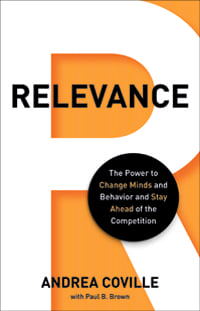
In public relations, sometimes we simply focus on the wrong things. It isn’t deliberate, obviously, and we might have had the best intentions. But none of that matters if our efforts miss the mark. And it happens far more often than we would like.
The truth is, it’s not about how many press releases you get out, how clever your messages are, the wonderful turn of phrase you created, or the number of hits the website gets. Ultimately, it is not about getting attention. Instead, public relations efforts should focus on action—making a difference in the audience’s behavior by persuading them to your point of view (to buy our client’s product or service or to embrace their cause).
Relevance is the way to do that. It is also the way to make sure you stay focused on the right things.
By relevance we mean making sure everything you communicate is both practical—you are solving a problem someone has or are advocating something that will make their life better, and socially applicable—i.e., your message needs to resonant. It is rare when facts alone will do that.
Why relevance is so important

Relevance goes to the heart of the public relations process. The Public Relations Society of America defines public relations this way: “Public relations is a strategic communication process that builds mutually beneficial relationships between organizations and their publics.” Relevance is central to doing just that.
As you know better than most, the world has changed to our disadvantage. We cannot push our messages through a limited number of outlets, as we did when there were only three television networks and a relatively small number of places where people could engage. Now, consumers are the ones in control. They have an almost infinite number of ways to engage with whomever, and whatever, messages they choose.
By being relevant, we show respect for the people we are trying to reach. But we can only do that if we a) understand them and b) change as they do.
BMW is a company that does both those things well. Loyal BMW drivers are not getting any younger. We are sure the car company would say those people are aging like fine wines, but their median age is climbing nonetheless. The company is going to great lengths to accommodate them and the aches and pains that can afflict an aging body when it sits still for too long.
For example, the new driver’s seat on BMW’s 5 Series is radically different—and far more accommodating than it ever was. “It is the most comfortable seat of any kind, said one brand-loyal customer. “It’s like you are floating on a firm marshmallow. You are never going to have back pains from driving.” BMW changed as its customers did, in this case to accommodate an aging customer base. When it comes to your existing customers, you can never be complacent.
In a different vein, Avnet, one of the largest distributors of electronic components, computer products, and embedded technology, is proving it is relevant by recognizing what is going on in the economy. (Full disclosure: Avnet works with Brodeur Partners, the firm co-author Andrea runs.)
 High tech companies, who tend to be Avnet’s customers, need smart, qualified workers. At the same time, today’s students need financial aid to pay for school and jobs once they graduate. Avnet, brings them together through its “Avnet Tech Games,” an annual college technology competition that provides students with an opportunity to apply what they learn in school to real-world scenarios—building faster computers; creating green data centers—and compete for scholarships.
High tech companies, who tend to be Avnet’s customers, need smart, qualified workers. At the same time, today’s students need financial aid to pay for school and jobs once they graduate. Avnet, brings them together through its “Avnet Tech Games,” an annual college technology competition that provides students with an opportunity to apply what they learn in school to real-world scenarios—building faster computers; creating green data centers—and compete for scholarships.
The twist here is that just about all the students who compete get to network not only with Avnet, but with companies such as CA, Cisco, HP, and Kyocera who help sponsor the competition and many end up with internships and even job offers.
Being relevant makes it easier for us to:
- Get the attention of the people we are trying to reach
- Encourage them to consider what we have to say—or our client has to sell
- Get them to change their behavior toward endorsing something that is important to us
- Keeping them as clients or customers if we already have them.
As you strategize and plan your next PR campaign, ask yourself: is what I plan to communicate both practical and applicable to my audience? Further, am I communicating it in a way that is also practical and socially applicable? These questions will ensure that you are focusing on the right things. As a result, you and your clients will both benefit.
Andrea Coville and Paul B. Brown are the authors of Relevance: The Power to Change Minds and Behavior and Stay Ahead of the Competition (March 2014, Bibliomotion).
Follow Andrea: @AndreaCoville
Follow Paul: @FromPaulBBrown

What a great article. Relevance. It might become the new buzz word, because if you aren’t, then whatever you’re producing doesn’t matter.
Case in point – WalMart. After five negative quarters, they still struggle to keep their shelves stocked with branded products. Being ‘out of stock’ over and over makes them become irrelevant. They will of course deny this approach as invalid and give all sorts of statistics they proves they are, but… In the real trenches of everyday ‘keep it in stoc’k, they are not relevant. So many of the people that shop there, from the late 20’s to a much older age are brand shoppers. I know my wife, my mother, her mother, my two daughters, etc., are all brand shoppers. If I bring home a ‘second choice’ as a fill in, I get ‘the look’, “what’s this”?
When this happens as another ‘out of stock’ again and again, WM becomes irrelevant and the buyer goes somewhere else in spite of the cost savings. WM bet is off. They shop somewhere else. Period. In the meantime, the world isn’t sitting still. Three more dollar stores and an Aldi’s have moved into the area, making WM even less relevant for those areas closer to home.
See how a simple thing as having branded products ‘in stock’ makes a big difference? How about your sales strategy? Are you ‘in stock’ with the latest and best content for your customers?